Islamic Republic’s Agents Abduct 85-Year-Old Genetics Professor
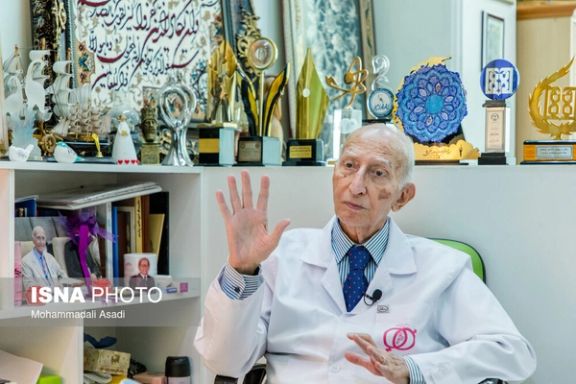
Iranian plainclothes forces have abducted Dariush Farhoud, an 85-year-old professor of medical and clinical genetics known as the father of Iran’s genetics.

Iranian plainclothes forces have abducted Dariush Farhoud, an 85-year-old professor of medical and clinical genetics known as the father of Iran’s genetics.
According to reports, Farhoud was arrested by the security forces at his home Sunday morning, and there has been no information about where and why he was taken.
The renowned scientist had earlier criticized the Islamic Republic for its violation of women's rights.
Earlier this year, Farhoud criticized the regime’s plans to ban pre-natal screening and legal abortions, describing them as violations of human rights. He called them a backward move to 200 years ago.
The government's population and family planning policies include a ban on contraceptives, vasectomy and tubectomy, and prenatal screening for genetic abnormalities and congenital diseases.
Moreover, the parliament has passed legislation to outlaw tubectomy, vasectomy, and the free dispensation of contraceptives other than where pregnancy would threaten a woman's health. The health ministry has advised women over 35 to wait only a year before becoming pregnant again and under-35s to wait six months.
Medical experts have warned that the new legislation would also increase sexually transmitted diseases by restricting access to condoms.
Earlier in the year, Supreme Leader Ali Khamenei said efforts to increase the country's population are among the most urgent duties and essential policies of the Islamic Republic.
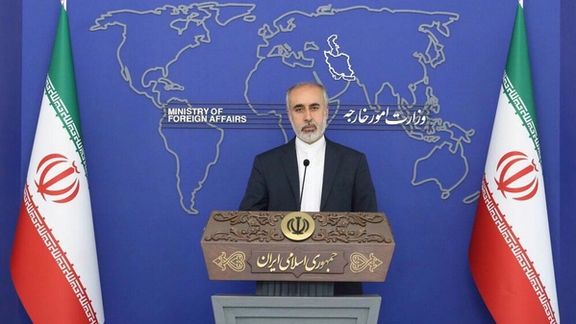
Iran has called criticism over its handling of popular protests “intervention” in its “internal affairs” and slammed Germany’s plans to list the IRGC as a terrorist entity.
Foreign ministry spokesman Naser Kanaani in his weekly briefing on Monday said that the Revolutionary Guard (IRGC) is an official military organization of the Islamic Republic and sanctioning it would be “a totally illegal act.”
“Statements by German officials about sanctioning the IRGC, following unconstructive and irresponsible actions by this country, emanates from their wrong approach toward the government and people of Iran,” Kanaani claimed. He added, Iran “hopes that Germany and other countries who have a plan in this regard, will pay attention to their unconstructive actions and not sacrifice their bilateral relations to passing political issues and emotional decisions.”
Iran’s security forces have killed at least 270 citizens since protests broke out in mid-September when a 22-year-old woman, Mahsa Amini was killed in ‘morality police’ custody. The government has deployed tens of thousands of regular IRGC troops, its Basij militia and plainclothes agents to attack protesters. Thousands have been arrested and more than 1,000 already indicted for participating in demonstrations.
German Foreign Minister Annalena Baerbock said Sunday that her country and the European Union were examining whether to classify Iran’s Revolutionary Guard as a terrorist organization for its use of violence in the protests.

"I made it clear last week that we will launch another package of sanctions, that we will examine how we can also list the Revolutionary Guards [IRGC] as a terrorist organization," Baerbock said in an interview with ARD broadcaster on Sunday.
The IRGC is already listed as a terrorist organization by the United States and Tehran tried hard during the long nuclear negotiations in 2021 and 2022 to have Washington lift the designation. The Biden Administration called such demands extraneous to the nuclear talks.
The negotiations have paused since August over Iran’s demands, which are unacceptable for the United States. When Tehran adopted its position in response to an EU draft proposal, protests had not started and now it finds itself in more international isolation than two months ago.
US and Albania have also proposed an informal UN Security Council meeting to discuss the situation in Iran. The format of the meeting is called the “Arria formula”, after its originator, Diego Arria, a Venezuelan ambassador who in 1992 initiated the first informal meeting of the Council to discuss the crisis in former Yugoslavia. The meetings take place in a non-rigid setup where member states can hear comments by individuals and non-state actors.
Iran’s foreign ministry spokesman on Monday dismissed the significance of the meeting and claimed that the aim of the meeting is to put “political pressure on the Islamic Republic,” and is the continuation of a clear policy of interference by the American government in Iran’s internal developments.”
Kanaani criticized the US for planning to ask Iranian expatriate activists to testify during the informal Security Council meeting, calling such individuals “known elements” with Iranian identity, who in the past never raised their voice against US sanctions.
The spokesman again repeated Iranian denials about supplying military drones to Russia used against civilian targets in Ukraine. Kanaani said that Tehran has never supplied weapons to the warring sides. The denials come as the United States and others have raised strong objections to the deployment of mostly suicide drones and Ukraine has produced evidence obtained from downed UAVs.
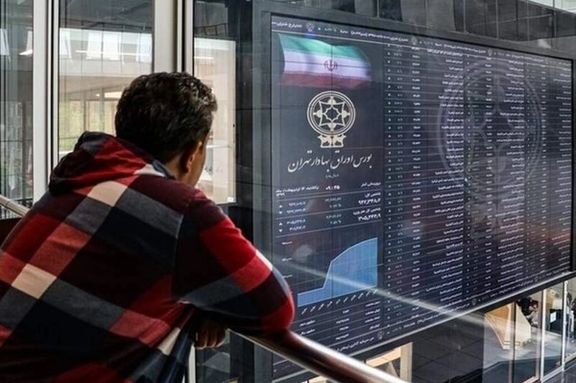
Amid nationwide antigovernment protests, over 36 trillion rials (over $120 million) has been withdrawn from Tehran’s Stock Exchange market only in the past 10 days.
The amount of capital withdrawal from the stock market and the fall of the total index has been accelerating in the past few weeks as protests and strikes have been intensifying especially after mid-September, when a 22-year-old woman was killed in police custody.
The withdrawn money may seem meager compared with international stock exchanges, but TSE is the most important and biggest Iranian stock exchange market, and considering the currency rate, it amounts to a huge sum in rials.
TEDPIX, the main index of Tehran Stock Exchange (TSE), lost 69,000 points in the previous Iranian calendar week, which ended on Friday, October 28.
Since mid-May, the index has been in constant decline due to political uncertainties, with a few small insignificant peaks when the hopes for reviving Iran’s 2015 nuclear deal were high momentarily.
The future of Iran’s exchange market will depend on political stability, structural reforms and restoring the Joint Comprehensive Plan of Action (JCPOA), all of which seem improbable as the current wave of protects shows no sign of abating and more and more countries are intensifying their punitive measures against the regime and its officials.
On October 18, United States’ officials reiterated their support for the ongoing protests in Iran with Special Envoy Robert Malley saying that the talks to revive the nuclear deal are no longer on the agenda.
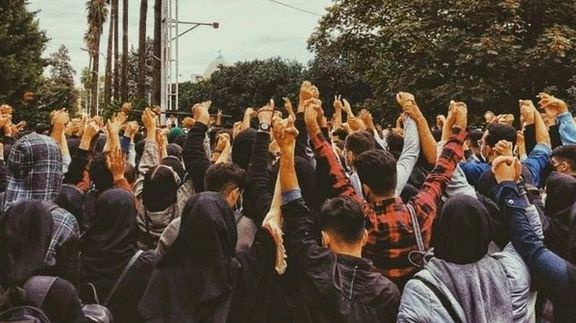
Iran's security forces focusing on student protesters lately are using plainclothes agents to arrest and abduct students in universities across the country.
By Iranian law, military and law enforcement forces are banned from entering university grounds or making arrests inside campuses, but in the past few days plainclothes agents have attacked student gatherings and dormitories in several universities arresting several hundred people often using great violence.
University security guards responsible for protection of students often looked the other way or cooperated with the plainclothes agents, students say. Protests, however, have grown even bigger after the attacks and arrests.
“Please help! They are murdering us here! We need the world to hear our voice,” a student from Sadaf dorm of Jondishapour University in Ahvaz told me in a chat in the early hours of Saturday morning.
Minutes earlier security forces had raided Sadaf dorm. A video students shared on Twitter showed several plainclothesmen dragging a student, Mohammad Safaei, on the floor while he cried for help from fellow students.
Students besieged by IRGC Basij forces inside a section of Mashhad University
“They cut off the power in the dormitory and forced their way into the building … The [plainclothes] IRGC and Basij people and intelligence ministry agents have stationed themselves in front of the entrance and are preventing students from coming and going,” the student said, adding that the assailants threatened to shoot other students to stop them from helping Safaei. “They abducted four of us.”
Mobile internet was completely shut off and wi-fi was intermittent, my student contact said on the night of the raid. “It takes me so much effort to connect to the wi-fi, it’s exhausting to post anything.”
On the same night they arrested three other students for writing antigovernment slogans on the walls of their campus and protesting peacefully. “If a hair is lost [on the head of a student], a thousand will rise,” students who gathered on the campus grounds afterward the arrests chanted.
Similar raids have been made on several other campuses including Noshirvani University of Technology in the northern city of Babol in Mazandaran Province where at least 25 students were arrested Wednesday. Plainclothesmen fired bullets and tear gas inside the dormitory compound during the incident.
“They are shooting at us inside the university, it's not birdshot it's real live ammunition,” one of the students trapped at Sanandaj University tweeted Sunday morning while a Twitter post by a relative of a student abducted in Kermanshah, Mahshid Moshashaei, begged everyone for information on her whereabouts. Moshashaei was taken, apparently by intelligence ministry agents, from her dormitory on Saturday.
In Mashhad, Iran’s second most populous city, plainclothesmen barricaded the gate of Azad University for hours Saturday night and trapped the students inside. Parents and worried citizens who had gathered in front of the university were attacked by plainclothesmen, too. Students say around 10 of them were arrested during the standoff.
In a statement released on social media Sunday, said they would go on indefinite strike in protest to the violence by university security and plainclothesmen.
Students have posted a video showing a young woman, probably a student, being forced into a car by plainclothes agents early Saturday morning in front of the same university. Witnesses said on Twitter that those who tried to prevent the abduction were tasered by one of the plainclothes agents.
Plainclothesmen’s violence against students has risen to such levels that students belonging to the regime’s Basij militia have found it indefensible and even repugnant.
In a video posted on Twitter, the Basiji student recording a standoff between protesting students and the agents at Esfahan University Saturday says, “They are not Basijis, [pro-government] revolutionary students are on this side. These guys who are wielding chains [to hit students] are hooligans who are from outside [the university].”
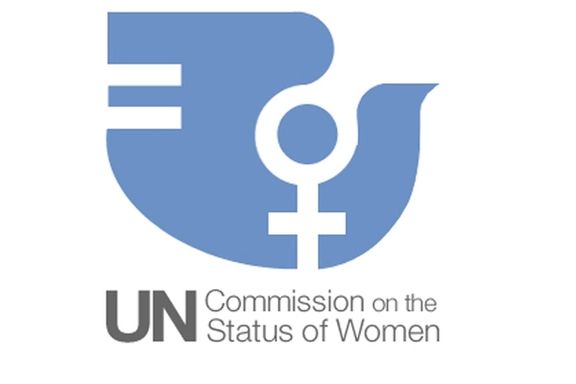
A group of women leaders in business, politics, and the arts from over 14 countries has called for the immediate expulsion of the Islamic Republic from the UN Commission on the Status of Women (CSW).
In an open letter, published in The New York Times on Sunday, the preeminent leaders expressed their solidarity with Iranian women and girls, as well as men, who are holding daily protests for more than 40 days across the country and abroad following the death in custody of 22-year-old Mahsa Jina Amini.
Signatories of the letter include former US Secretary of State Hillary Clinton and First Lady Michelle Obama, Canada's Deputy Prime Minister Chrystia Freeland and media tycoon Oprah Winfrey as well as Nobel laureates Malala Yousafzai and Nadia Murad.
They also launched a petition on www.womanlifefreedom.today that calls on the United Nations to expel the Islamic Republic from the commission, receiving more than 21,000 signatures within the first few days of going live. Additionally, more than 130,000 petitioners have also signed another letter asking for the same outcome on Change.org.
Lamenting the Islamic Republic's record on women's rights and the brutal violence of security forces against peaceful protesters, they said, “Earlier this year, to the dismay of women's rights advocates around the world, Iran began a four–year term on the UN's 45–member Commission on the Status of Women. This preeminent global body is exclusively dedicated to promoting gender equality and women's empowerment. The Islamic Republic of Iran's long–standing, systematic oppression of women should have disqualified them from election to the CSW."
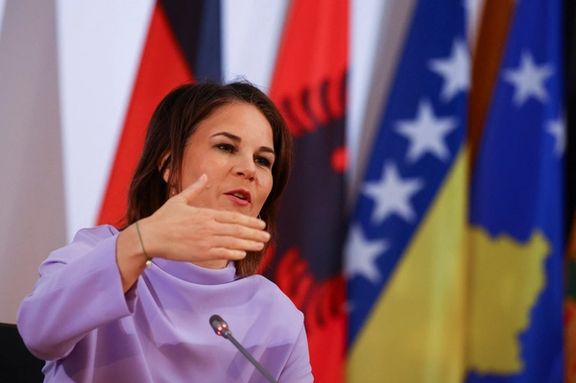
Germany and the European Union are examining whether to classify Iran's Revolutionary Guard as a terrorist organization, Foreign Minister Annalena Baerbock said Sunday.
"I made it clear last week that we will launch another package of sanctions, that we will examine how we can also list the Revolutionary Guards [IRGC] as a terrorist organization," Baerbock said in an interview with ARD broadcaster on Sunday.
Iran’s security forces headed by the IRGC have killed more than 270 people during the six-week long protests.
The IRGC is already listed as a terrorist organization by the United States.
Her comments come after the head of the Revolutionary Guard, Hossein Salami, warned protesters that Saturday would be their last day of taking to the streets, in a sign that security forces may intensify their already fierce crackdown on widespread unrest.
However, students in several Iranian universities protested on Sunday, with security forces breaching the campus enclosures violating the law and trying to disperse and arrest student.
Anonymous protest leaders have called for nationwide demonstrations on Monday, October 31.
Germany last week said it was tightening entry restrictions on Iran beyond an already announced EU sanctions package.
Baebock also said there were currently no negotiations about the nuclear agreement between Iran and the West.
Reporting by Reuters